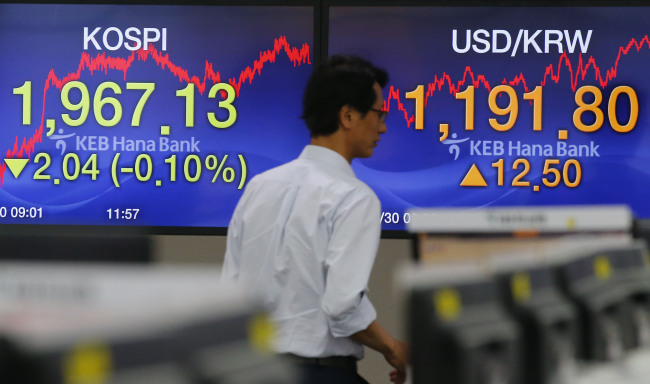Korea to face volatility on MSCI inclusion of China shares
By Park Hyung-kiPublished : May 30, 2016 - 15:09
The second possible inclusion of U.S.-listed Chinese blue chips, including Alibaba and Baidu, into the Morgan Stanley Capital International’s Emerging Markets index on May 31 is expected to trigger capital outflows from Korea’s stock market, analysts warned.
With increasing exposure to Chinese tech and consumer heavyweights on the $3.5 trillion global index, institutional investors such as pension funds are bound to realign their equity portfolios to growth stocks such as those from China, the world’s second-largest economy.
With increasing exposure to Chinese tech and consumer heavyweights on the $3.5 trillion global index, institutional investors such as pension funds are bound to realign their equity portfolios to growth stocks such as those from China, the world’s second-largest economy.

This would likely lead to a fall in the Korean benchmark KOSPI, and a rise in the won-dollar exchange as the potential scenario based on previous investment patterns shows that foreign investors will unload their Seoul shares and exchange the Korean currency to U.S. dollars.
“If the MSCI inclusion of Chinese (American Depository Receipts and A-shares) is realized, there is a possibility of the exchange rate rising to around 1,200 won,” said So Jae-yong, an analyst at Hana Financial Investment, noting that there is a 60 percent chance for A-shares traded on the Shanghai and Shenzhen stock markets to be included in the MSCI EM index.
Although the issues on the inclusions of Chinese ADRs and A-shares are separate, analysts say the market cannot rule out the possibility of A-shares becoming part of the global index, as China has been improving its equity transparency and accessibility to address investors’ concerns.
The MSCI is expected to decide whether to include A-shares in the EM index in June.
Last November, foreign investors sold off Korean shares to the tune of 538.2 billion won ($451.6 million) when the MSCI included the first batch of Chinese ADRs into the EM index. The KOSPI fell to around 1,920 then.
The same thing could happen once again for the Korean stock and exchange markets when the second inclusion occurs as Chinese shares on the EM index will account for about 26 percent of the total, with Korean equity exposure will decrease from 15.38 percent to 14.99 percent.
“Net sell-offs by foreign investors will likely be inevitable,” said Lee Kyung-min, an analyst at Daishin Securities.
However, the Chinese inclusion in the MSCI EM will not be the only thing that could trigger foreign sell-offs and increase market volatility.
The next Federal Open Market Committee meeting on June 14-15 on whether to raise its benchmark interest rate could further weigh down the Korean stock market and depreciate the won. The U.S. Federal Reserve has sent its clearest message that an increase in the federal funds rate would be “appropriate” in June.
Foreign investors sold Korean shares of about 3 trillion won ahead of the FOMC meeting in December last year on growing expectations of a rate rise in the near future.
By Park Hyong-ki (hkp@heraldcorp.com)
“If the MSCI inclusion of Chinese (American Depository Receipts and A-shares) is realized, there is a possibility of the exchange rate rising to around 1,200 won,” said So Jae-yong, an analyst at Hana Financial Investment, noting that there is a 60 percent chance for A-shares traded on the Shanghai and Shenzhen stock markets to be included in the MSCI EM index.
Although the issues on the inclusions of Chinese ADRs and A-shares are separate, analysts say the market cannot rule out the possibility of A-shares becoming part of the global index, as China has been improving its equity transparency and accessibility to address investors’ concerns.
The MSCI is expected to decide whether to include A-shares in the EM index in June.
Last November, foreign investors sold off Korean shares to the tune of 538.2 billion won ($451.6 million) when the MSCI included the first batch of Chinese ADRs into the EM index. The KOSPI fell to around 1,920 then.
The same thing could happen once again for the Korean stock and exchange markets when the second inclusion occurs as Chinese shares on the EM index will account for about 26 percent of the total, with Korean equity exposure will decrease from 15.38 percent to 14.99 percent.
“Net sell-offs by foreign investors will likely be inevitable,” said Lee Kyung-min, an analyst at Daishin Securities.
However, the Chinese inclusion in the MSCI EM will not be the only thing that could trigger foreign sell-offs and increase market volatility.
The next Federal Open Market Committee meeting on June 14-15 on whether to raise its benchmark interest rate could further weigh down the Korean stock market and depreciate the won. The U.S. Federal Reserve has sent its clearest message that an increase in the federal funds rate would be “appropriate” in June.
Foreign investors sold Korean shares of about 3 trillion won ahead of the FOMC meeting in December last year on growing expectations of a rate rise in the near future.
By Park Hyong-ki (hkp@heraldcorp.com)








![[Today’s K-pop] BTS pop-up event to come to Seoul](http://res.heraldm.com/phpwas/restmb_idxmake.php?idx=644&simg=/content/image/2024/04/17/20240417050734_0.jpg&u=)
![[Graphic News] More Koreans say they plan long-distance trips this year](http://res.heraldm.com/phpwas/restmb_idxmake.php?idx=644&simg=/content/image/2024/04/17/20240417050828_0.gif&u=)






![[KH Explains] Hyundai's full hybrid edge to pay off amid slow transition to pure EVs](http://res.heraldm.com/phpwas/restmb_idxmake.php?idx=652&simg=/content/image/2024/04/18/20240418050645_0.jpg&u=20240419100350)

